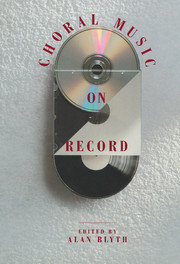Book contents
- Frontmatter
- Contents
- Preface
- Monteverdi: Vespers (1610)
- J.S. Bach: St John Passion
- J.S. Bach: St Matthew Passion
- J.S. Bach: Mass in B Minor
- Handel: Messiah
- Mozart: Requiem Mass
- Haydn: The Creation
- Haydn: The Seasons
- Beethoven: Missa Solemnis
- Mendelssohn: Elijah
- Rossini: Stabat mater Petite messe solennelle
- Berlioz: Grande Messe des Morts Te Deum L'Enfance du Christ
- Verdi: Requiem Mass
- Brahms: A German Requiem
- Fauré: Requiem
- Elgar: The Dream of Gerontius
- Walton: Belshazzar's Feast, Tippett: A Child of Our Time, Britten: War Requiem
- Stravinsky: The Wedding Symphony of Psalms
- Janáček: Glagolitic Mass
- Discographies
- Index
Walton: Belshazzar's Feast, Tippett: A Child of Our Time, Britten: War Requiem
Published online by Cambridge University Press: 02 December 2009
- Frontmatter
- Contents
- Preface
- Monteverdi: Vespers (1610)
- J.S. Bach: St John Passion
- J.S. Bach: St Matthew Passion
- J.S. Bach: Mass in B Minor
- Handel: Messiah
- Mozart: Requiem Mass
- Haydn: The Creation
- Haydn: The Seasons
- Beethoven: Missa Solemnis
- Mendelssohn: Elijah
- Rossini: Stabat mater Petite messe solennelle
- Berlioz: Grande Messe des Morts Te Deum L'Enfance du Christ
- Verdi: Requiem Mass
- Brahms: A German Requiem
- Fauré: Requiem
- Elgar: The Dream of Gerontius
- Walton: Belshazzar's Feast, Tippett: A Child of Our Time, Britten: War Requiem
- Stravinsky: The Wedding Symphony of Psalms
- Janáček: Glagolitic Mass
- Discographies
- Index
Summary
After the injection of post-Wagnerian Romanticism administered to English choral music by Elgar through The Dream of Gerontius in 1900, four major works appeared during the subsequent sixty-two years which showed how powerful a stimulant it had been to composers' imaginations. The first, Vaughan Williams's A Sea Symphony, was heard at the Leeds Festival in 1910 and most obviously betrays the Elgar influence while at the same time proclaiming a new and powerful individual voice. Of the other three, Walton's Belshazzar's Feast was composed between the wars in 1931; Tippett's A Child of Our Time appeared during the Second World War, in 1944; and Britten's War Requiem was first performed in 1962, seventeen years after the end of the Second World War, although it is the First World War that it commemorates. Of these four works, only one, Britten's, may be said to be religious, although its use of the Latin text of the Requiem Mass is almost secularised by the interpolation of nine poems by Wilfred Owen. It is true that Belshazzar's Feast has a text compiled from the Old Testament by Osbert Sitwell, but it is not religious music in any spiritual sense, while Tippett's oratorio A Child of Our Time has a libretto by the composer which is interspersed, in the manner of the chorales in Bach's Passions, by Negro spirituals. Vaughan Williams selected passages from Whitman for his Sea Symphony, some of which have a religious connotation.
Belshazzar's Feast is the most frequently recorded of these works, and probably the most frequently performed too.
- Type
- Chapter
- Information
- Choral Music on Record , pp. 236 - 248Publisher: Cambridge University PressPrint publication year: 1991



